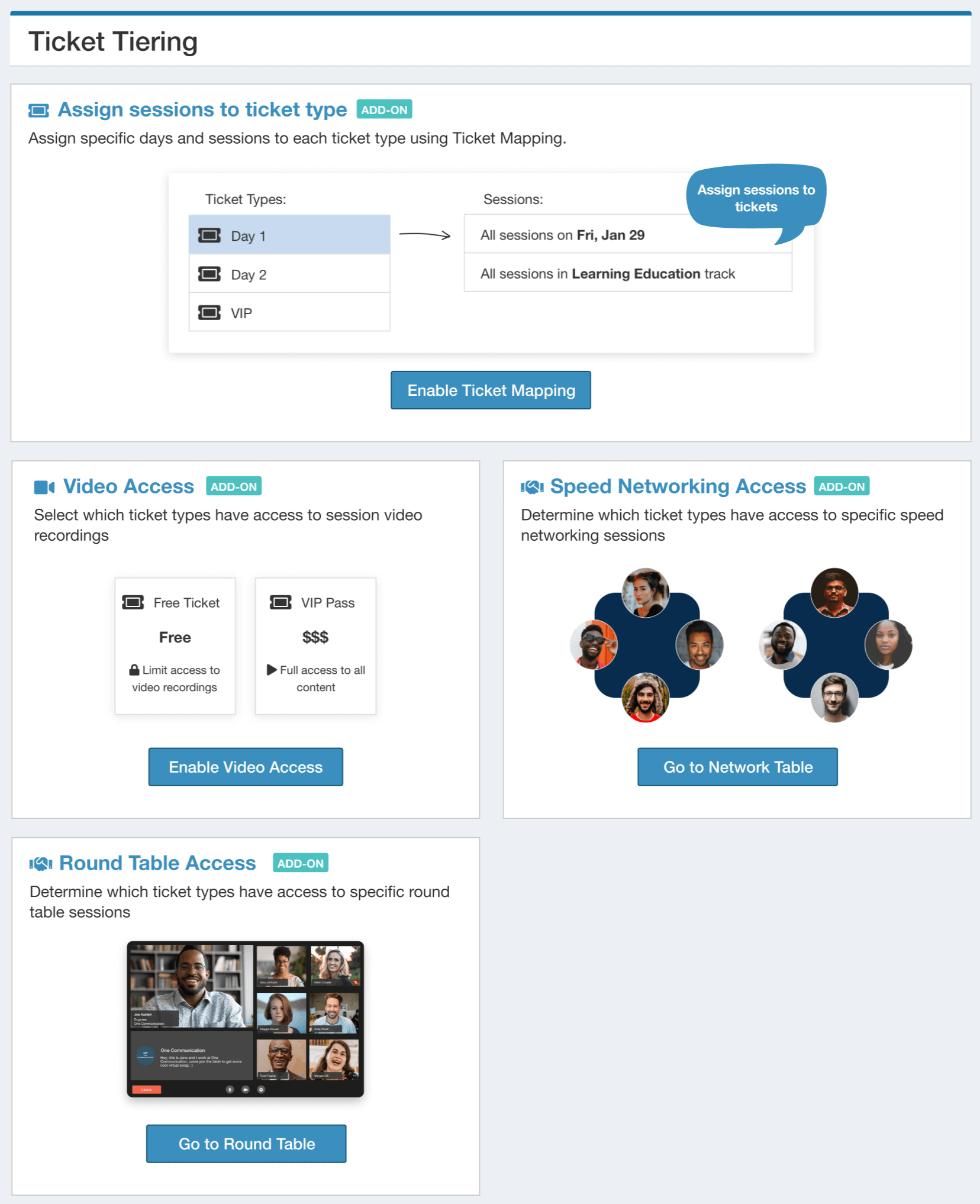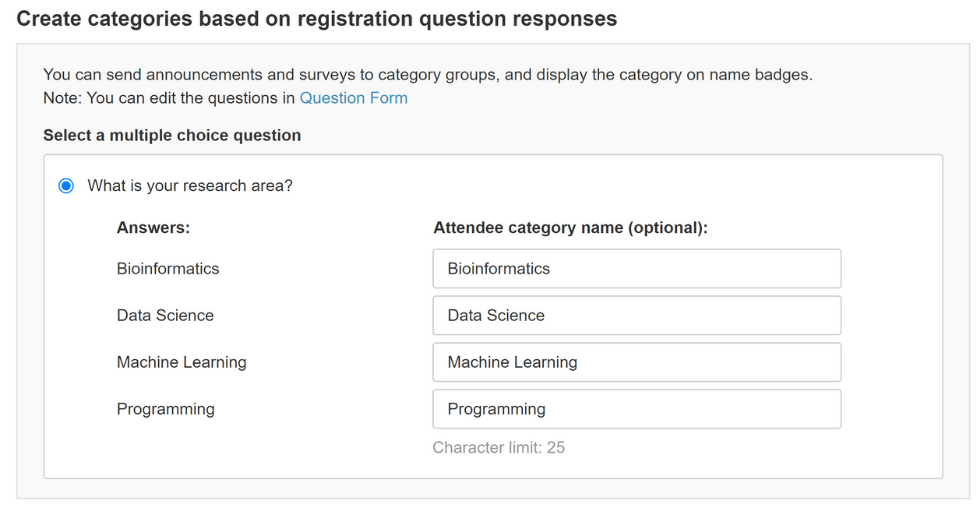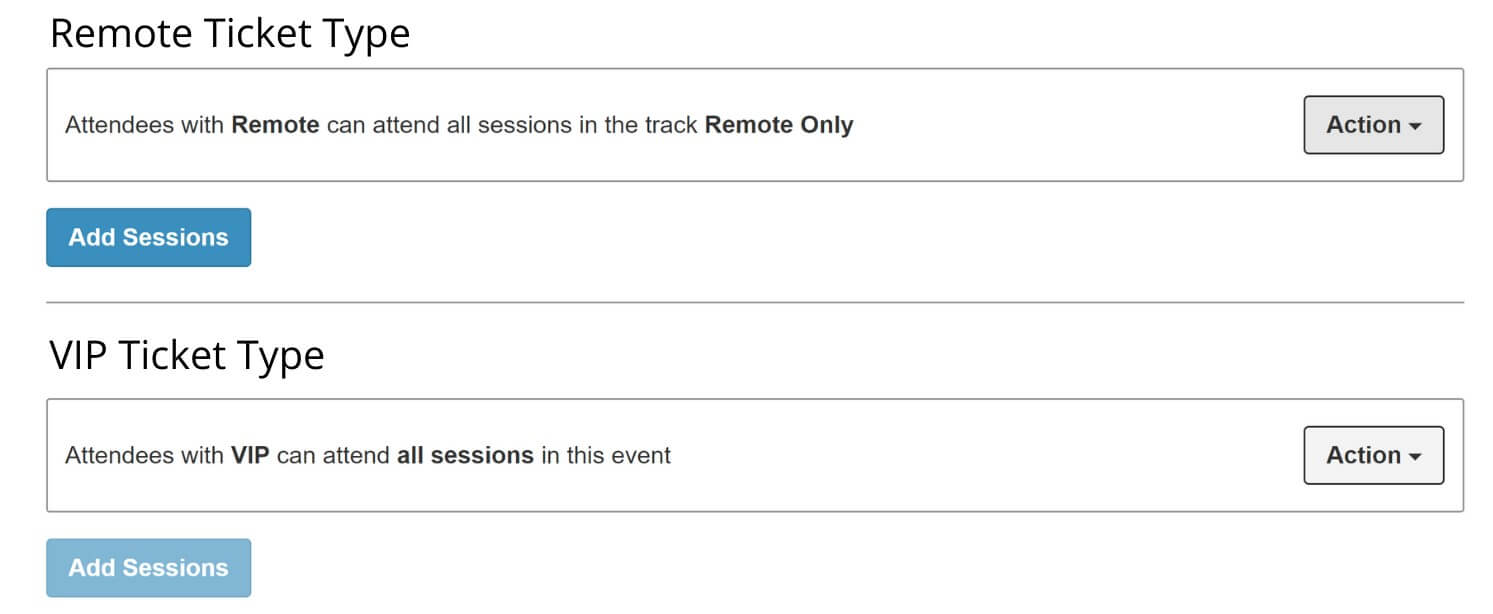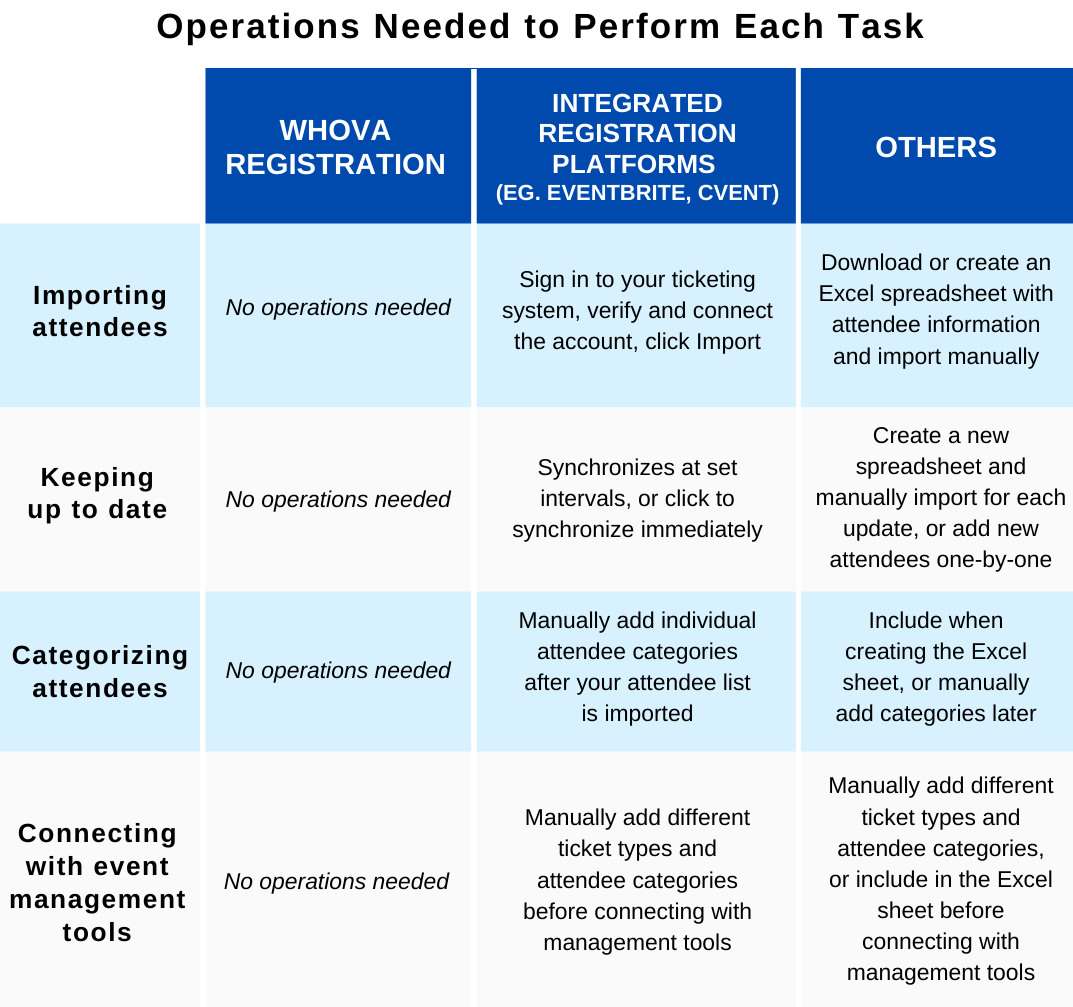As an event organizer, you likely know how complicated managing ticketing can be, which is why Whova has always made sure to provide a registration platform that conveniently integrates with the rest of your event.
After all, managing ticket information doesn’t end once registration does. For instance, you may be planning an event with multiple ticket types and need to create separate experiences for different ticket holders. That can feel like a lot of pieces to juggle, especially if you’re planning a larger or more complicated event!
Whova registration tightly integrates ticketing information with the rest of our event management system, from instantly syncing with the attendee list to creating different attendee categories based on ticket type. With our latest registration update, you can create different event experiences for different ticket holders more conveniently than ever, making your job much easier.
Directly integrate registration information with event management tools
Whova’s event management platform has a variety of flexible, easy-to-use features to simplify event management. Organizers can map certain ticket types to specific sessions, send announcements, polls, and surveys to different attendee groups, and much more.
Easily create unique experiences for different ticket types by using ticket type information to create attendee categories, communicate with attendees, and control content. You can manage all of this directly from registration as it automatically integrates with the rest of your event management platform as attendees register.

Whova’s centralized ticket tiering makes it simple to manage attendees’ access to different content
With Whova’s tightly integrated registration, you can:
#1. Instantly sync the registration information with the rest of the event platform
There’s no getting around it: registering attendees through the same platform you use to manage the rest of your event makes a big difference. Using another registration platform requires you to take the time and energy to figure out how the two platforms you’re using connect with one another. You also have to categorize attendees yourself, correct any inconsistencies or differences in how the information transfers between platforms, and take the time to re-synchronize information as more attendees register.
With Whova registration, all the information collected during registration is automatically uploaded to the platform! From there, you can use that ticketing information to manage attendees for the rest of the event.
#2. Categorize your attendees with ticket types and answers to registration questions
Being able to divide your attendees into different groups can have a number of benefits; not only is it better for creating specific networking opportunities, such as grouping graduating classes at reunions or connecting attendees in similar fields, but it also simplifies event management. With Whova, organizers can easily create different name badges for exhibitors, speakers, and any other attendee category, as well as sending targeted announcements, polls, and surveys to these groups with the relevant information and questions.
Now, it’s easier than ever to create and assign these attendee categories. In the centralized Attendee Categories dashboard, organizers can directly connect these groups to the registration process with separate registration forms for different ticket types. If a certain ticket type connects to an attendee category — for example, a certain ticket for VIP attendees — then purchasing that ticket type will automatically assign the attendee to that category, rather than the organizers having to assign them to attendees one by one.
However, even if a certain category isn’t directly connected to a specific ticket type, you can still automatically assign these categories in registration by creating categories based on registration question responses. For instance, add a multiple-choice question to the registration form asking what research area attendees are interested in. If the registrants select “Bioinformatics” or “Machine Learning”, they’ll automatically be added to those categories.
Likewise, the registration form might ask if they’re presenting at the conference; if they say yes, they’ll be given the presenter category, and if they say no, they won’t be assigned an additional category for that question. This makes it just as easy to automatically assign useful attendee categories without having to create separate ticket types for each category.

Assign attendee categories based on their answers to registration questions
#3. Send announcements to specific ticket holders
Once attendee categories are created and assigned, it can be significantly easier to manage your event, especially when it comes to keeping in touch with different attendee groups. Whova’s announcement function allows organizers to easily send both emails and in-app notifications to keep attendees updated, and they can further target communication by specifying which categories the announcements should be sent to.
Organizers can keep attendees up to date on any changes to sessions on specific tracks, tell VIP attendees about exclusive opportunities for their ticket type, and easily reach exhibitors, presenters, and any other groups that may need certain information.
Similarly, they can create separate surveys and polls for different attendee categories so they can gather the information they need without overwhelming or confusing other attendee groups with information that isn’t relevant to them.
#4. Control session visibility for different ticket holders
Integrated registration also makes it easier for you to control access to content for different attendees. By assigning tickets and categories to specific days and sessions, you can control which sessions appear on attendees’ agendas, keeping their agenda relevant to them and making it easy for you to provide exclusive sessions to different ticket holders.
You can also control access to Whova’s Speed Networking and Round Table sessions to create different networking and interaction opportunities for various categories, and you can tier tickets further by giving video access to certain attendee categories and ticket types. For instance, you might give high-tier ticket holders access to behind-the-scenes content and other exclusive videos, or allow remote attendees at a hybrid event to access the recordings of in-person sessions.

Map ticket types to different sessions, speed networking sessions, and round tables
#5. Easily manage in-person and remote audiences at hybrid events
As much as you want to bring them together, in-person and remote attendees at hybrid events are bound to have different experiences. For instance, you might have some sessions or networking opportunities that are held entirely in-person or completely online, in-person attendees may need to receive announcements with updates about the venue, and remote attendees will need information on attending virtual sessions that doesn’t apply to your in-person audience.
Whova’s hybrid settings allow you to target sessions, surveys, announcements, and polls specifically for in-person or remote attendees. With tightly integrated registration, specifying an attendee’s audience type is just as easy as giving them an attendee category. The attendee can be automatically set as in-person or remote as soon as they buy the corresponding ticket, making it simple to manage both of your audiences separately.
Easily integrate ticketing with event management
By handling registration from a convenient centralized location, you can save time on the tedious logistics of event organization while directly reaching different attendee types. Whova’s direct integration of registration with event management tools makes your job easier while giving attendees enhanced, unique experiences.
Interested in learning more about Whova? Sign up today for a free product demo.
Related Case Studies

